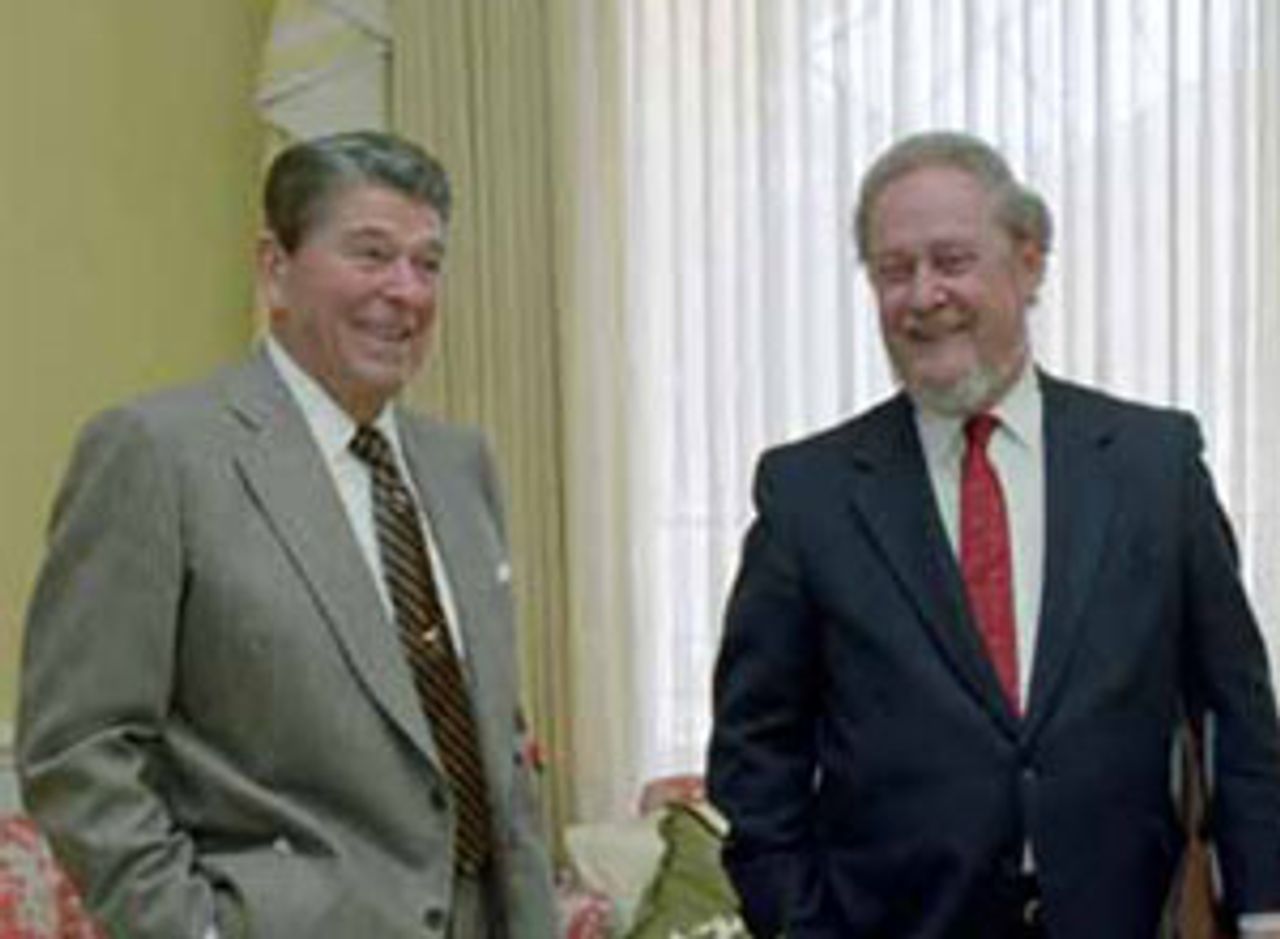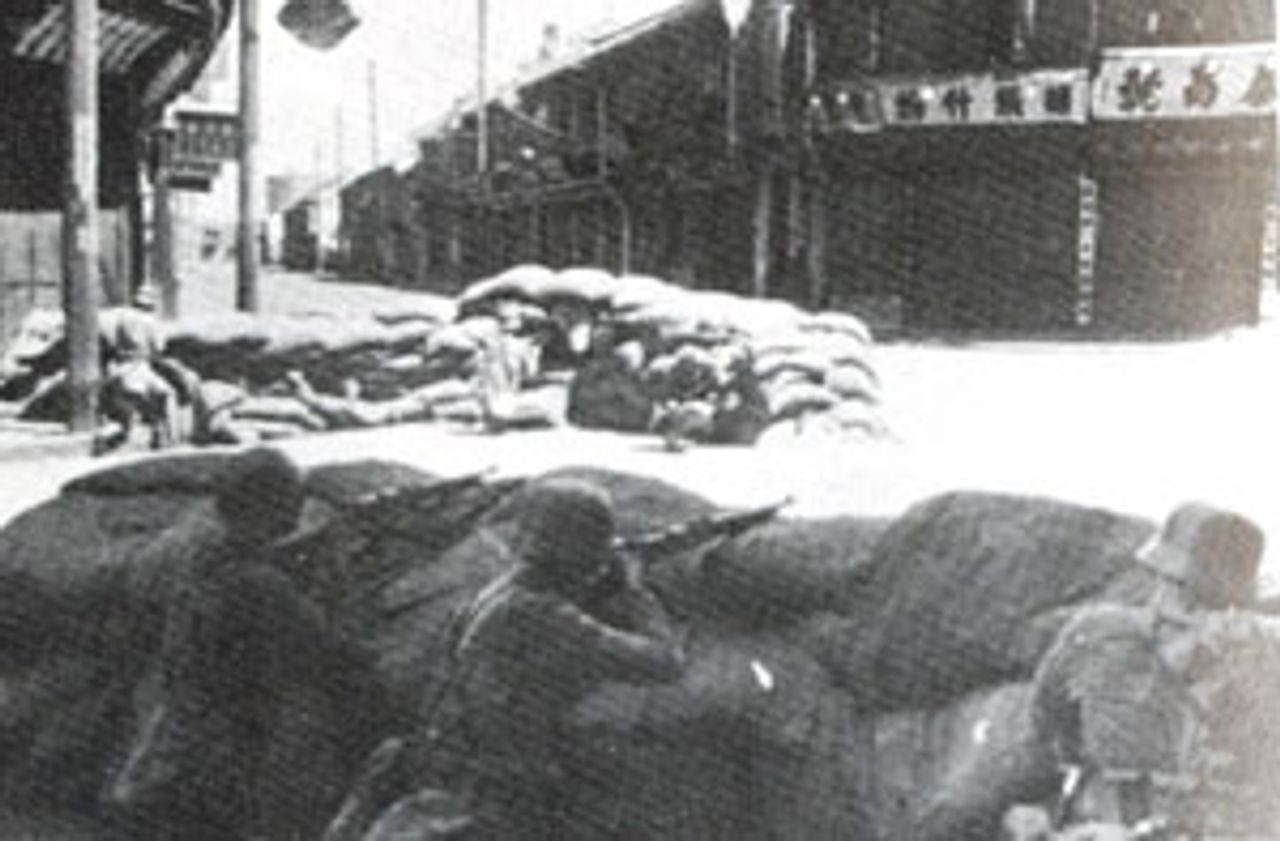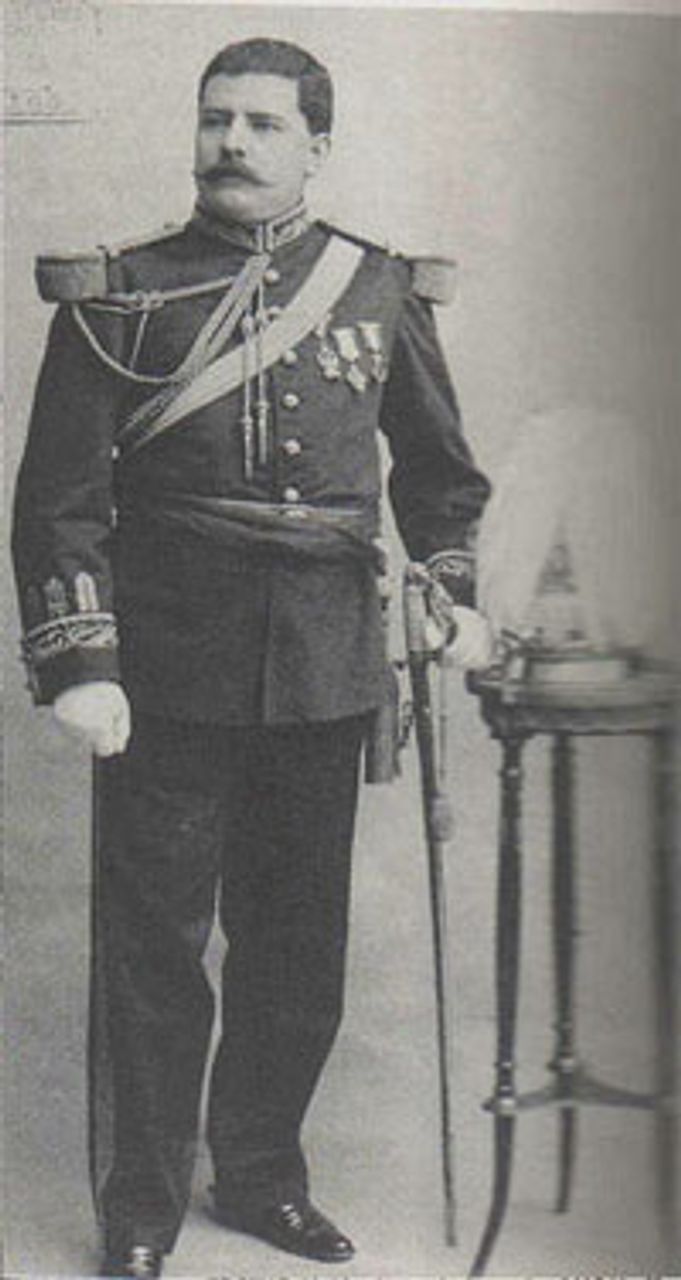This Week in History provides brief synopses of important historical events whose anniversaries fall this week.
25 Years Ago | 50 Years Ago | 75 Years Ago | 100 Years Ago
25 years ago: Reagan Supreme Court nominee rejected
 Reagan with Bork
Reagan with BorkAfter almost four months of confirmation hearings, the Senate rejected Reagan administration Supreme Court nominee Robert H. Bork on October 23, 1987. Bork was controversial for his ultra-right, anti-democratic views on the role of the judicial branch.
Bork opposed numerous Supreme Court rulings, including its upholding of the “one man, one vote” principle in the apportionment of state legislatures, the outlawing of segregated schools in the District of Columbia, and the striking down of state legislation banning the sale of contraceptives. He considered such rulings “judicial activism,” declaring them to be “legislating from the bench.” Bork claimed those court decisions stretched the meaning of the original constitutional provisions and “intent” of those who wrote the document 200 years before.
Reagan’s nomination of Bork was a direct challenge to the Democratic-controlled Senate. Despite the declarations of intent to fight his appointment by leading Democratic senators, including Edward Kennedy and Joseph Biden, Bork refused to withdraw from the nomination process. His eventual defeat by a 58 to 42 margin, though the widest since such hearings began in 1939, would be the last actual defeat of a right-wing nomination to the Supreme Court.
Bork later elaborated his reactionary views in a 1996 book titled Slouching Towards Gomorrah. In it, he claimed that all forms of liberalism are dangerous expressions of an egalitarian tendency “that has been growing in the West for at least two and a half centuries, and probably longer.”
Addressing the founding document of the American Revolution, the Declaration of Independence written by Thomas Jefferson, Bork wrote that its “ringing phrases are hardly useful, indeed may be pernicious, if taken, as they commonly are, as a guide to action, governmental or private. The words press eventually towards extremes of liberty and the pursuit of happiness that court personal license and social disorder.” The problem with Jefferson, Bork writes, was that he “was a man of the Enlightenment, and the Declaration of Independence is an Enlightenment document.”
50 years ago: Cuban missile crisis
 US intelligence photo indicating missile sites
US intelligence photo indicating missile sitesThis week in 1962 the world’s attention was gripped by the Cuban missile crisis, which posed the possibility of a nuclear confrontation between the US and the Soviet Union.
On the evening of October 22, US President John Kennedy announced on national television that he had “unmistakable evidence” that the Soviet Union had put in place missile sites in Cuba “that would provide a nuclear strike capability against the Western Hemisphere.” Kennedy announced a blockade and pointedly warned that any nuclear strike launched from the island nation would precipitate “a full retaliatory response upon the Soviet Union”—i.e., nuclear war.
War very nearly came. The Kennedy administration was itself sharply divided. Secretary of State Robert McNamara favored the blockade—which itself could have easily led to war—while US Air Force chief of staff Curtis LeMay favored a military attack on Cuba. Prominent Republican Senators had been persistently attacking Kennedy on his administration’s failures in Cuba, which included the Bay of Pigs debacle. Privately Kennedy and his advisors were tormented by what they called “the credibility gap” raised by the Castro revolution—the perception that the US would not use its overwhelming military preponderance to crush nationalist movements in the Third World.
On October 28, Kennedy and Khrushchev worked out a deal. In exchange for the removal of Soviet missiles from Cuba, Kennedy promised that the US would not invade the island. Secretly he also agreed to remove US nuclear weapons from Turkey. Because these terms were secret and because Moscow did not secure a lifting of the US trade embargo against Cuba or closure of the US base at Guantanamo Bay, the Cuban missile crisis was widely regarded as defeat for Khrushchev, which helped to strengthen the hand of his “hard-line” opponents within the Soviet Stalinist bureaucracy.
75 years ago: Chinese forces retreat from Shanghai
 Shanghai street fighting
Shanghai street fightingOn October 26, 1937, Chinese forces retreated from the district of Chapei (or Zhabei) in Shanghai, which had been bombed by Japanese warplanes for days in succession. As the Chinese retreated they systematically destroyed bridges and infrastructure while sabotaging and booby trapping, but leaving intact, other buildings and factories. “Chapei has been a cruel sight all day,” a correspondent for the London Times reported. “It is covered with towering masses of thick black cloud, with here and there flashes of flames showing the furnace underneath.”
The events brought to a close what is called the “second phase” of the Japanese invasion of Shanghai and began the third. The second phase had begun on August 23 and involved numerous Japanese amphibious landings on the coast of Jiangsu province, and the Chinese and Japanese armies fighting a bloody war of attrition, with house-to-house fighting in Shanghai’s downtown and surrounding districts. The final stage, announced by the evacuation of Chapei, ranged from October 27 through the end of November and involved the retreat of the Chinese army in the face of a Japanese pincer movement.
Pockets of resistance remained after October 26, with Chinese suicide squads resisting within Chapei, what the Times called “dare and die” teams, but the vast majority of defending troops retreated from the district in the face of superior Japanese armaments.
In refusing to attend the Far Eastern Conference in the Belgian city of Brussels on October 27, the Japanese government gave its definitive reason for invading China: to stop the tide of Bolshevism across Eurasia. “Japan is determined that China shall not be Bolshevised and is convinced that the only way to prevent this is to compel China to accept Japanese aid in stemming the Soviet tide,” the Times reported.
100 years ago: Fighting in Veracruz as Mexican revolution continues
 Felix Diaz
Felix DiazOn October 23, 1912, forces loyal to the regime of the liberal reformer Francisco Madero defeated a right-wing coup in the geo-strategically and economically critical port-town of Veracruz. The coup attempt, which had been launched on October 16, was led by General Felix Diaz and funded to the tune of 5000 pounds sterling by Mexican expatriates based in Paris, who supported the former US-backed dictator Porfirio Diaz. Felix Diaz was a nephew of the former ruler and had held positions in his regime.
Felix Diaz calculated that he could take Veracruz with the support of Washington, which deployed the USS Des Moines to the port city on October 20, and the backing of local military commanders. However, the coup attempt had been poorly prepared and Diaz received little active support. The coup was suppressed within six hours of fighting. Diaz was taken prisoner by government troops and sentenced to death by a military court martial on October 26.
The attempted coup in Veracruz took place in the context of intense political instability and conflict stemming from the Mexican revolution, which had begun in 1910-11. Porfirio Diaz’s regime was overthrown in late June 1911 as a result of a popular revolt headed by Madero.
Madero’s calls for reform, and his verbal opposition to American imperialism, had won broad support in the preceding years, but he won only a minuscule proportion of the vote in the 1910 presidential elections, which were rigged by Diaz. The fixing of the election provided the impulse for a series of upheavals against Diaz’s regime. In November 1911, Madero was elected president. However he formed a right-wing cabinet that was hostile to the demands for a redistribution of wealth and land coming from radicalized layers of the peasantry and the working class. This prompted uprisings and social upheavals to intensify.
Madero was opposed from the right by conservative layers of the Mexican elite who had supported the Diaz regime and oriented to Washington, including Felix Diaz, General Bernardo Reyes, and Victoriano Huerta, and from the left by a series of revolts demanding agrarian reform, most notably, that led by Emiliano Zapata.
